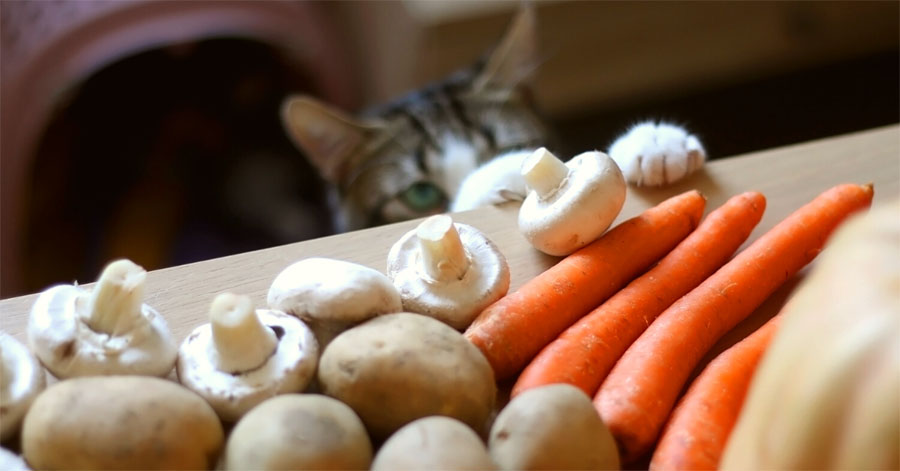
The Giant List of Vegetables That Cats Can Eat
When you’re making dinner and your cat’s begging for a taste, you might wonder if there are any vegetables cats can eat. Cats are obligate carnivores, meaning they get 100% of their nutrients from meat-based proteins and fats. Unlike their human or canine counterparts, cats don’t actually need vegetables.
But that doesn’t mean they don’t enjoy nibbling on veggies from time to time!
In fact, the occasional vegetable can be a satisfying treat to enhance your kitty’s diet. Keep reading for our giant list of vegetables that cats can eat (plus a few they should skip).
11 Vegetables Cats Can Eat
Always check with your vet when determining what to feed your cat. Dietary needs vary from feline to feline and even across each life stage. Kittens, young adults, and senior kitties each have their own specific nutritional needs, especially if they need to drop a few ounces.
But paws down, anything from this giant list of vegetables is sure to make your cat purr.
Celery
With its high water content, celery can be a hydrating snack for cats. Just be sure to dice it into bite-sized pieces before your cat eats it.
As an added bonus, celery has diuretic properties and can encourage proper kidney function.
Broccoli
This veggie is a great occasional treat. High in antioxidants, it’s an excellent addition to your cat’s high-protein diet. Steam it first, then allow it to cool to room temperature before serving it to your kitty.
Fresh Green Peas
You can safely feed fresh green peas to your adult and senior cats. However, avoid serving peas to kittens.
Once weaned, kittens especially need lots of protein, healthy fats, and a small amount of calcium. They don’t need peas or other starchy vegetables in their diet.
When treating your cat to green peas, cook them first and serve in small quantities.
Peas are full of fiber and are often used as filler in some pet foods. So if they are an ingredient in your cat’s food, skip this veggie and opt for a different healthy treat.
Cucumber
You can serve this vegetable raw – just be sure to wash and peel it first. During the hot summer months, try freezing small cubes of cucumber and adding them to your cat’s food or in their water dish as a fun treat.
A word of caution: Because of its high water content, too much cucumber can lead to diarrhea. Moderation is key!
Carrots
Cooked carrots are an excellent source of nutrients. They’re rich in beta-carotene, which converts to vitamin A, a powerful antioxidant. Some experts suggest that cats have limited ability to convert beta-carotene to vitamin A.
So carrots won’t be a major source of this important nutrient in your cat’s diet. But in moderation, they can still be a tasty treat.
Raw carrots are difficult to chew and can pose problems for your kitty’s digestive system. So be sure to cook them first and chop them into small bite-size pieces to prevent choking.
Zucchini
Zucchini is even popular in many commercial pet foods. It has a high water content and, when cooked, is safe to feed to your cat.
Low in calories and carbs, but high in vitamins A & C, zucchini is a safe vegetable for your cat to eat.
Lettuce
Some cats love leafy greens!
Our Facebook friend, Roxann, says of her cat, “Gemma likes lettuce
“.
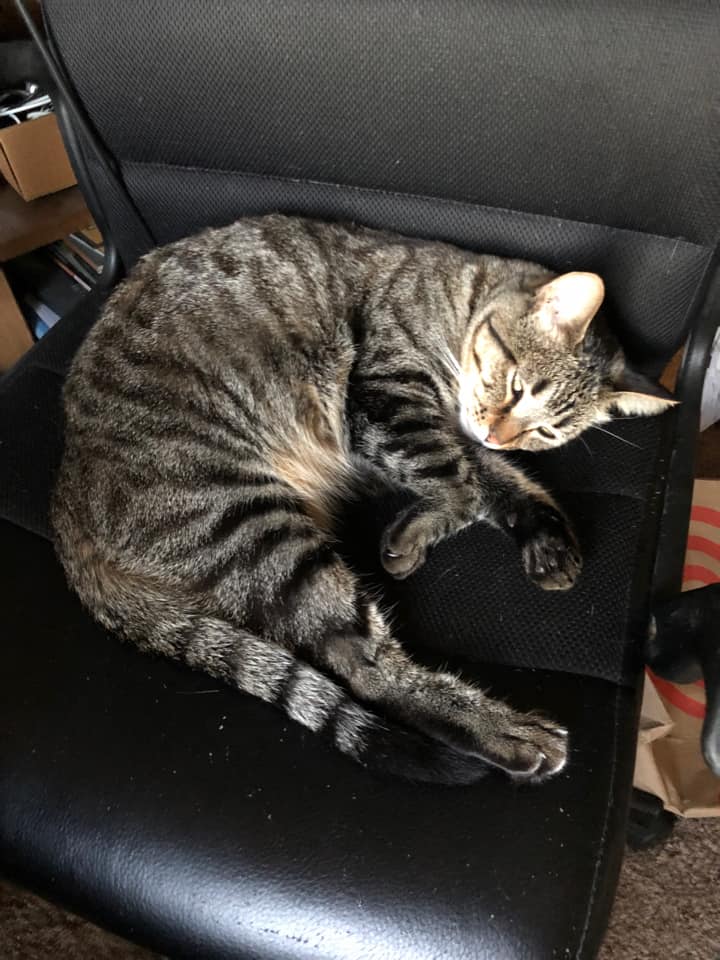
All types of lettuce are safe for cats, including romaine and iceberg. Simply chop into bite-sized pieces and let your kitty enjoy this healthy treat.
Winter Squash or Pumpkin
Plain winter squash, when eaten in moderation, can help your cat’s digestive system. If your kitty struggles with constipation or diarrhea, winter squash may be just the snack their body needs.
Plus, many cats love the flavor and texture of cooked winter squash and pumpkin!
Sweet Potato
Sweet potatoes are higher in carbs, so they aren’t necessary for our carnivorous felines. However, if your cat could use a slight boost in fiber, then cooked and unseasoned sweet potatoes are a nice addition to their protein-packed meals.
Pin Me!
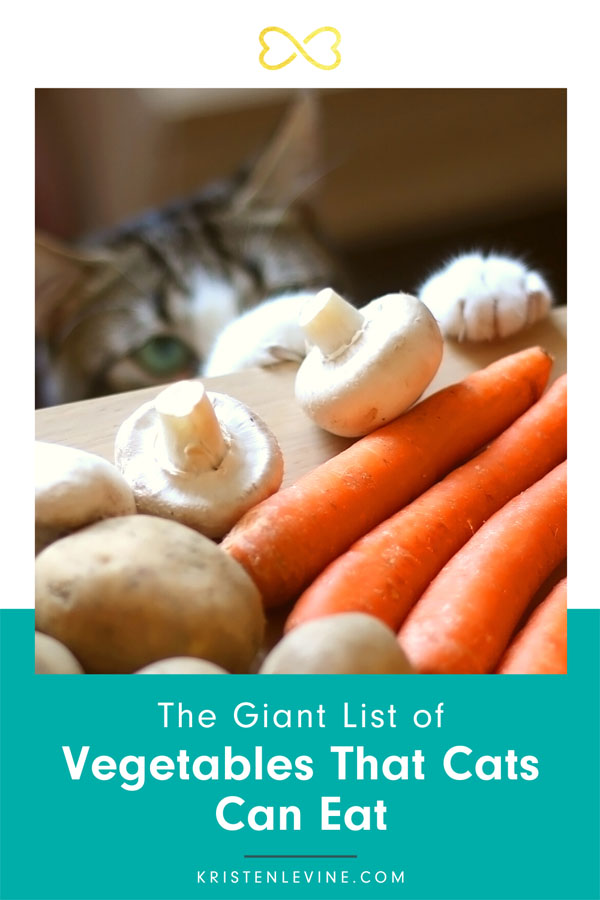
Asparagus
Small, occasional snacks are key with asparagus. This veggie is high in fiber which could potentially lead to an upset stomach. And it’s highly alkaline, meaning large amounts could affect the healthy bacteria in their urinary tract.
Green Beans
The natural crunch of green beans makes them an excellent alternative to traditional treats. In fact, some kitties prefer gnawing on raw green beans! But feel free to cook this vegetable to make it easier to chew and digest.
Vegetables Cats Should Not Eat
Not all vegetables are created equal. In fact, some are actually toxic for your kitty even in small quantities. Avoid the following vegetables and contact your veterinarian if your cat ingests these items:
Tomatoes
Avoid tomatoes in all their forms: fresh, in sauces, or even in soups and broths. Tomatoes contain solanine, a natural pesticide that’s toxic to cats.
Onions
Onions are poisonous to cats! So avoid this vegetable in all of its forms: raw, cooked, and powdered.
Onions have sulfur-containing compounds that cats can’t digest. Even the smallest amount damages your cat’s red blood cells leading to anemia.
Garlic
Garlic falls into the same category as onions and is perhaps the most toxic of the group. Vomiting, diarrhea, fatigue, pale gums, and reddish-brown colored urine are all signs that your kitty has been affected by ingesting garlic.
Get them to the veterinarian right away! Even tiny amounts can lead to organ failure or death if left untreated.
Avocados
Avocados may be a favorite among humans, but their high-fat content makes them a no-no for kitties. Eating avocados can lead to vomiting and even acute pancreatitis. Skip this natural treat altogether.
An additional word of caution: Never feed your cat grapes, raisins, or citrus. Experts aren’t sure why, but grapes and raisins can lead to rapid kidney failure in cats. And citrus can cause digestive issues, vomiting, and diarrhea.
FAQ’S
Technically, yes. However, some vegetables like carrots and squash are more easily digested when cooked and cut into small, bite-sized pieces. However, no seasonings or oils should be added to cooked vegetables as those can be dangerous for your kitty’s health.
Yes, but in moderation. Regular potatoes are high in carbohydrates, and in general, may not be all that appealing to your cat. But if you choose to serve this vegetable, cook it without any additional seasonings, spices, or oils.
Raw potatoes are difficult to chew and actually contain a toxic substance called solanine, which is poisonous to cats when digested. Sweet potatoes, on the other hand, are a safer alternative for your cat.
Did you know that cats don’t have sweet taste receptors? This explains why many felines just aren’t all that interested in fruit. But if you’d like to incorporate fruit into your cat’s diet, the following are safe for consumption:
Bananas
Watermelon
Strawberries
Blueberries, Raspberries, and Blackberries
Apples
Mangoes
Pineapple
Cantaloupe
The Tail End
Our feline fur friends are natural-born carnivores and get most of their nutrition from a protein-packed diet. But that doesn’t exclude an occasional veggie snack. Some kitties find leafy greens or crunchy green beans irresistible.
Our giant list of vegetables is the purr-fect resource if you’re looking for a healthy, natural treat for your cat.
This article is not intended to provide medical advice and is for entertainment purposes only. Always check with your veterinarian regarding foods that are safe for your cat.



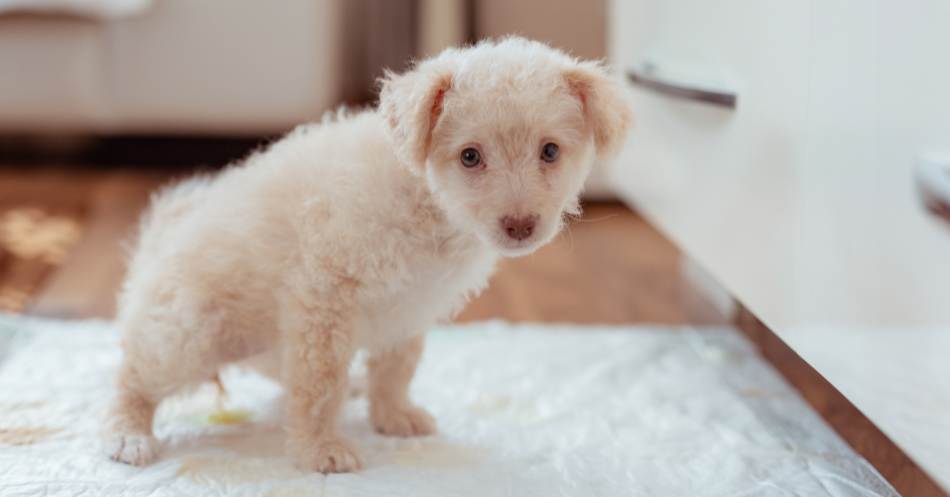

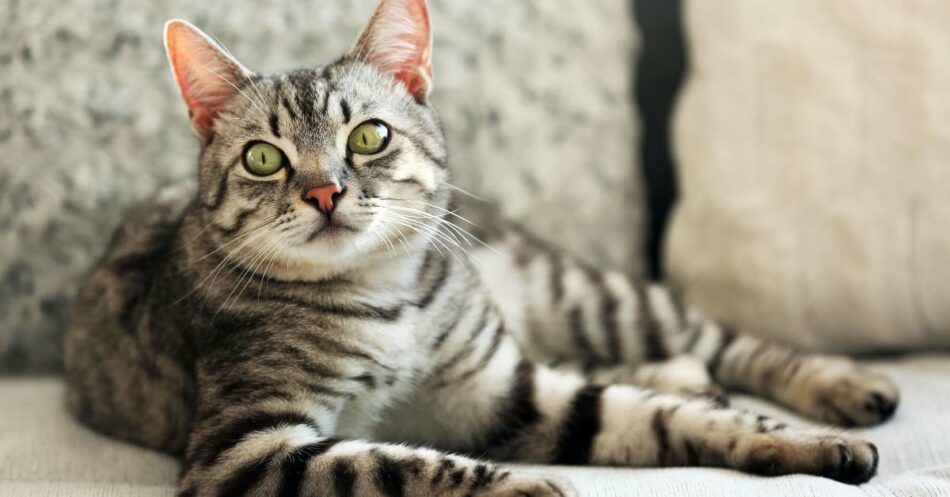

Comments (0)